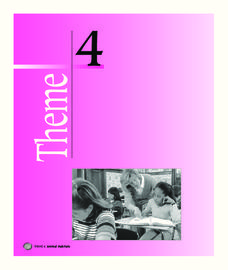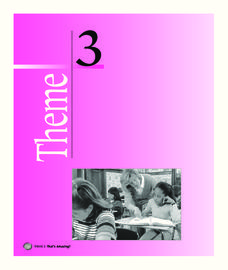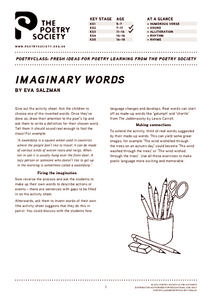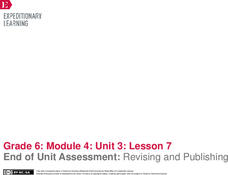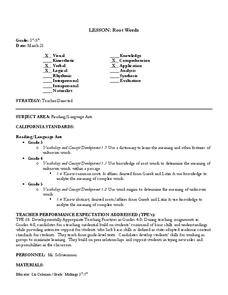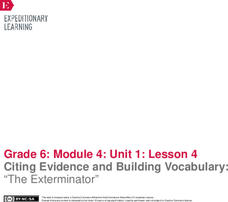All About Reading
Pirate Dictionary
Shiver me timbers, this here resource is a great way to teach young landlubbers to speak the language of the briny deep. Including over 30 different words and phrases, complete with definitions and guide words, this dictionary will have...
Texas Education Agency (TEA)
Cognates (English III Reading)
Did you know that "30-40 percent of all words in English have a related word in Spanish?" This fact launches an interactive study of cognates appearing the same in English and Spanish. Learners demonstrate what they have learned about...
TLS Books
Dictionary Skills Review
Why do we use a dictionary? Your scholars will tell you why while demonstrating their dictionary skills. In addition to stating the purpose of using dictionaries, they will also show what they know about guide words, alphabetizing, and...
Texas Education Agency (TEA)
Reference Guides (English III Reading)
An interactive resource introduces users to dictionaries, glossaries, and thesauri and the significant differences among these reference guides. Users learn which reference is best for which kind of search, examine sample entries from...
Houghton Mifflin Harcourt
Smart Solutions: English Language Development Lessons (Theme 6)
Smart Solutions is the theme of a unit created to meet the needs of English language earners. Through a series of lessons, scholars follow a routine—move, speak, and listen— to cover topics including stores, shops, celebrations, pets,...
Houghton Mifflin Harcourt
Around Town: Neighborhood and Community: English Language Development Lessons (Theme 3)
Here is a unit designed to support English language development. Scholars speak, move, and write to learn more about topics that focus on community and local concepts. The series of lessons aids to reinforce concepts including consonant...
Houghton Mifflin Harcourt
Off to Adventure!: English Language Development Lessons (Theme 1)
Give language skills a boost with a series of ESL lessons in an Off to Adventure! themed unit. Using a speak, listen, move, and look routine, scholars enhance proficiency through grand conversation and skills practice. Discussion topics...
Houghton Mifflin Harcourt
Animal Habitats: English Language Development Lessons (Theme 4)
This activities in this packet, the second in the series of support materials for the Houghton Mifflin Harcourt thematic units on animal habitats, are designed specifically for English language learners.
Scholastic
Frindle Lesson Plan
"Who says a pen has to be called a pen? Why not call it a frindle?" Inspired by this quote from the award-winning novel written by Andrew Celements, this lesson allows children to invent their own terms for common classroom objects,...
Houghton Mifflin Harcourt
That’s Amazing!: English Language Development Lessons (Theme 3)
That's Amazing! is the theme of an English language development unit created by Houghton Mifflin. Following a speak, look, move, and listen routine, scholars delve into topics; seasons, weather, animals, landforms, telling time,...
Amazon Web Services
Idiom Dictionary
Examining idioms is a peace of cake when using this graphic organizer! Here, grammarians identify an idiom and use it in a sentence. Then they investigate its literal meaning versus its figurative meaning, and accompany each one with a...
Poetry Society
Imaginary Words
Oh, what fun! Young logophiles and neologists create a dictionary-sounding definition for imaginary words and try to fool their classmates.
EngageNY
End of Unit Assessment: Revising and Publishing
Dictionaries, thesauruses, word walls, oh my! Pupils use several resources to revise their position papers to include appropriate vocabulary. Then, after peer editing, scholars write the final drafts of their essays and self-assess using...
Lawrence Virtual School
Context Clues
Considering a lesson on using context clues to figure out the meaning of unfamiliar words? This packet includes a brief reading passage about strategies readers can use and 12 very different graphic organizers, including a template for a...
University Interscholastic League
English Lesson to Prepare for UIL Spelling and Vocabulary Contest
"i before e. . ." Spelling is easier if kids know the eight basic spelling rules contained in this resource packet.
Haut Gap Middle School
Root Words
Scholars demonstrate their knowledge of root words aqua and aud, and develop vocabulary skills by completing of a chart, handout, and worksheet using creative thinking skills, a dictionary, and a thesaurus.
EngageNY
Resource Materials and Gathering Information: Reading Another “Choice” Text from the Research Folder
Look it up. Scholars use a dictionary and thesaurus to verify the meaning of the research vocabulary words they defined in the previous activity. They then use sticky notes to write a synonym for each word. Finally, individuals choose a...
EngageNY
Launching The Performance Task: Building Background Knowledge: “War in the Pacific,” Part 1
It's all about a bit of give and take. Scholars silently read War in the Pacific and circle any unfamiliar words. Using context clues, they write each word on a strip of paper along with the inferred definition. After looking the word up...
EngageNY
Reading for Gist, Answering Text-Dependent Questions, and Determining Author’s Purpose: Industrial Food Chain
A Reading Closely: Guiding Questions handout leads readers to discover the gist of The Omnivore’s Dilemma. While reading, pupils look closely at the words in the text and discuss their meaning. They use dictionaries when needed to answer...
EngageNY
Establishing Routines for Discussing A Long Walk to Water (Chapter 6)
Middle schoolers use a reader's dictionary to locate words they do not know in chapter 6 of A Long Walk to Water. They then turn attention to gist and work on a Salva/Nya anchor chart to record what happens to the characters. Finally,...
EngageNY
Carl Hiaasen’s Perspective of Florida: Part 2
Look it up. Scholars read Florida: A Paradise of Scandals Excerpt 1 and use a dictionary to look up any unfamiliar words. They then do a close read of the text and answer text-dependent questions. Learners analyze author perspective by...
EngageNY
Citing Evidence and Building Vocabulary: “The Exterminator”
It is an out-of-body experience. Scholars take a look at the sidebars outside the body of the text in The Exterminator. They discuss the purpose of this type of text feature and work to determine the gist. Learners write unfamiliar...
Prestwick House
Connotative vs. Denotative Meanings
Besides the dictionary definition, words also carry the added weight of meanings that are inferred or implied, meanings conferred on words, or connotations. To gain an understanding the importance of connotation, class members engage in...
Poetry4kids
Simile and Metaphor Lesson Plan
Similes and metaphors are the focus of a poetry lesson complete with two exercises. Scholars read poetry excerpts, underline comparative phrases, then identify whether it contains a simile or metaphor. They then write five similes and...
Other popular searches
- Oxford English Dictionary
- English Dictionary Use
- Tagalog English Dictionary
- Tagalo English Dictionary









